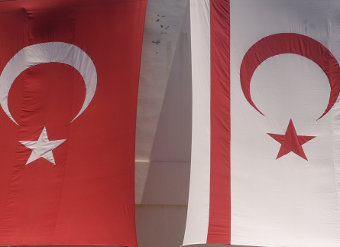Northern Cyprus held the second round of its presidential election on 26 April, with Mustafa Akıncı defeating the incumbent President, Derviş Eroğlu. Rebecca Bryant writes on what the result of the election might mean for the people of northern Cyprus and future negotiations with the Greek Cypriot-controlled Republic of Cyprus. She notes that while Akıncı’s victory has been met with euphoria on both sides of the island, all indications are that he will not only work toward a federation, but will also seek to defend the interests of Turkish Cypriots.

Turkish flag alongside the flag of the self-declared Turkish Republic of Northern Cyprus. Credit: Nick Leonard (CC-BY-SA-3.0)
Entrenched political parties are crumbling these days in the Eastern Mediterranean. The upstart Syriza handily defeated its elder rivals in Greece, while the Kurdish-backed HDP is on the rise amongst liberal and left-wing voters in Turkey. And now in north Cyprus, an independent leftist candidate won the presidency in a landslide victory on 26 April that many are celebrating as a concrete step towards peace.
Certainly, the election of Mustafa Akıncı, long-time mayor of north Nicosia, has already brought the first glimpse of hope that this small community has had in more than a decade. But while many foreign observers and the Turkish Cypriot left are declaring this a triumph for reconciliation, the surge towards a candidate who positioned himself outside the party system is also a symptom of other worrying developments that will not be so easily resolved at the negotiating table.
This blog post was originally published by the London School of Economics and Political Science. You can read the rest of the post here.